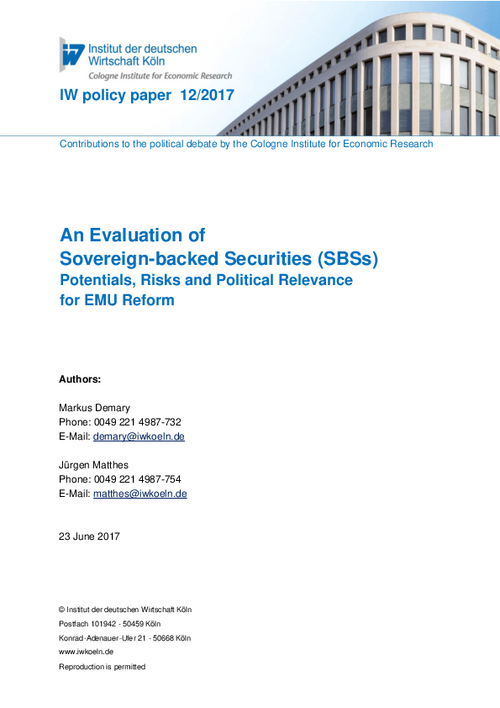The EU Commission proposes establishing Sovereign-Backed Securities (SBSs) as a class of safe assets for the euro area. SBSs are generated by an issuing agency that would purchase a large diversified portfolio of national sovereign bonds, and finance the purchases by issuing (at least) two types of structured bonds: a risk-free senior SBSs tranche and a risky junior SBSs tranche.

An Evaluation of Sovereign-backed Securities (SBSs)
IW policy paper

The EU Commission proposes establishing Sovereign-Backed Securities (SBSs) as a class of safe assets for the euro area. SBSs are generated by an issuing agency that would purchase a large diversified portfolio of national sovereign bonds, and finance the purchases by issuing (at least) two types of structured bonds: a risk-free senior SBSs tranche and a risky junior SBSs tranche.
Overall, we recognise that the SBSs concept has the theoretical potential to improve financial stability and financial integration in the euro area, provided it is built on a sound framework that overcomes several potential technical and political problems. However, SBSs could pose the risk of eventually leading to unconditional debt mutualisation in times of severe crisis.
With regard to technical problems, it is not clear whether the SBSs concept represents a viable business model for a private entity, and whether senior and junior SBSs would find sufficient demand, particularly in times of crisis. If the market for the junior tranche broke down, the whole concept would collapse. In such instances, the political risk could arise that rescue measures are taken that, in contrast to existing rescue mechanisms (ESM and OMT), are not subject to sufficient controls by Member States, solvency tests and reform requirements (conditionality). Another political risk relates to the introduction of the SBSs concept, which is regarded here as one part of a political compromise. We foresee the danger that the second part –de-privileging national sovereign bonds in banking regulation to sever the sovereign-banking nexus – may not be followed through, due to political resistance and to sequencing problems with introducing SBSs. Other political problems concern possible market distortions even in non-crisis times (particularly in primary markets), and the potential irreversibility of the concept.
If the general political will is found to consider establishing SBSs after the German elections, the concept should only be introduced if a public consultation clearly showed that it was sufficiently promising. It is only in this instance that our suggestions for a sound rules-based SBSs framework become relevant: the SBS agency needs to be a private entity in order to prevent political interference and should buy national sovereign bonds only at market conditions to avoid distortions. Senior and junior SBSs tranches need to be created with a conservative tranching strategy to guarantee sufficient safety and demand. Banks should be able to hold junior SBSs only with risk-adequate capital requirements and strict volume limits. The de-privileging of national sovereign bonds can and must be guaranteed by a forward-looking but legally binding decision. In the meantime, privileges for SBSs must not go beyond those currently relevant for national sovereign bonds. Clear arrangements are needed ex ante for severe crises, to prevent unconditional rescues. However, it remains questionable whether such a framework can prove time-consistent.

Markus Demary / Jürgen Matthes: An Evaluation of Sovereign-backed Securities (SBSs) – Potentials, Risks and Political Relevance for EMU Reform
IW policy paper


Berliner Gespräche Frühjahrstagung: Zwischen Sicherheitspolitik, Green Deal und Wettbewerbsfähigkeit – eine europapolitische Bestandsaufnahme
Das Institut der deutschen Wirtschaft möchte Sie erneut zu einer virtuellen Variante der „Berliner Gespräche” einladen.
IW
Die Zukunft Europas: Welche Prioritäten sind für die Wettbewerbsfähigkeit entscheidend?
Die Europäische Union hat ihre neue strategische Agenda für die Jahre 2024 bis 2029 veröffentlicht. IW-Direktor Michael Hüther und HRI-Präsident Bert Rürup analysieren im Handelsblatt-Podcast „Economic Challenges” die Bedeutung der Wettbewerbsfähigkeit für die ...
IW